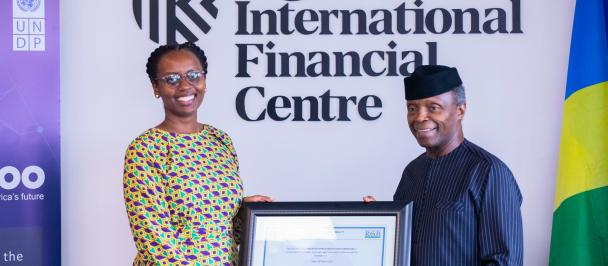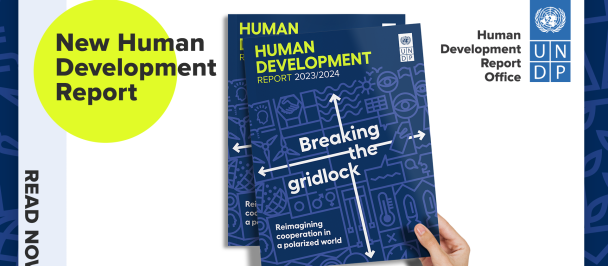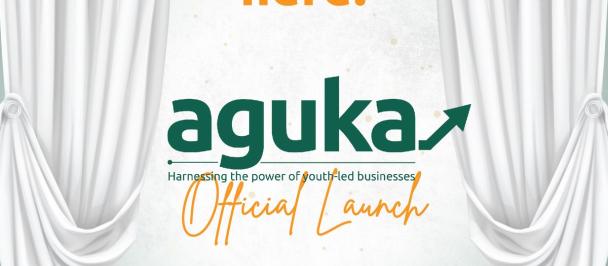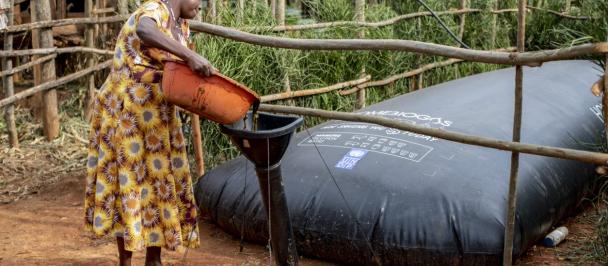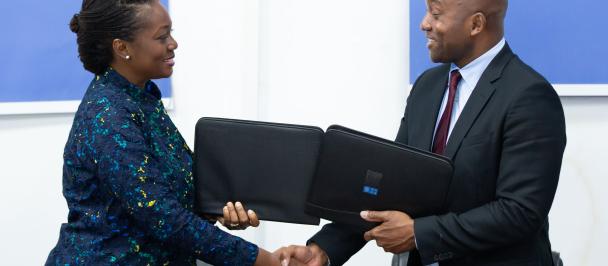FEATURED: How UNDP is addressing impact of COVID-19 pandemic on lives of vulnerable women
August 2, 2022

Pelagie Yaramfashije was given financial support which she used to buy livestock such as goats.
When Pelagie Yaramfashije, a wife to an ex-combatant and resident of Gashora, Bugesera District, had just returned to Rwanda, one of her biggest challenges was the lack of a permanent place to stay.
Along with her six kids, she had to move every now and then in order to find a place that was willing to host her and her entire family. As a farmer, she embarked on tilling other people’s land in order to earn an income. In the midst of these struggles, COVID-19 hit and her situation worsened.
“When the pandemic started, it was hard sustaining the family but farming helped us survive. At least I got food to feed us,” she says.
Later, when Rwanda Demobilization and Reintegration Commission (RDRC) intervened, her life and that of her family improved for the better.
“I was given financial support which I invested and managed to buy livestock such as goats. I also started saving money for construction. I later sold some goats and bought iron sheets, slowly by slowly, I saved and managed to construct a house,” she narrates.

The livestock business helped Pelagie Yaramfashije to build a house.
Owning a home gave Yaramfashije security and a sense of belonging, as she says. Her kids can now go to school and because of this, she is thankful.
“I am grateful; I encourage donors to continue supporting those who are in need. RDRC and UNDP were there when we needed them the most, and for that, may God bless them.”
Just like Yaramfashije, Emerance Mukandoli, a resident of Nyamagabe, Southern province, is among the beneficiaries that were supported by RDRC.
With her seven kids, supporting her family didn’t come easy, but with financial aid of over Rwf 300,000, Mukandoli, her ex-combatant husband and kids saw their lives transform for the better.
She was able to construct a house with that money and bought livestock. It also helped them take their children back to school.

Emerance Mukandoli feeds her cow in Nyamagabe, Southern Province.
“On top of that, I learnt tailoring through their support. One of my sons got training in mechanics. After studying, they gave me a sewing machine along with other tailoring items; this is what I am now using for my business. We appreciate them a lot for what they did and the support they continue to give us,” Mukandoli says.

Emerance Mukandoli is also a tailor and this job has enabled her to get some money.
“I thank the commission and its partners because they managed to give me a better life. I also thank the government for welcoming and taking good care of us,” she adds.
Impact
In partnership with RDRC, UNDP under the Project to Support to the reintegration of ex-FDLR combatants and dependents repatriated to Rwanda from the Democratic Republic of Congo (DRC) in November 2018,” has supported 246 beneficiaries, who were enrolled and graduated in vocational skills training (102 women/girls and 144 men), while mothers with more than five children under 18 years received additional financial support to cover specific needs of women and their children.
These included supplement foods, pads, among other items. The Project was developed to respond to the immediate need for emergency support towards social and economic reintegration of ex-combatants and their dependents referred to as “Phase 65” of the Rwanda Demobilization and Reintegration Programme (RDRP).
The above numbers were recorded from the vulnerability assessment, which also identified 21 female victims of GBV who were provided with psychosocial support, Alexis Ndayisaba, an official from UNDP explains.
In addition to psychosocial support, the 21 GBV cases received medical support through individual counselling, social advice, and referrals to hospitals to address medical issues as per their individual needs. This group is mostly composed of ex combatants’ wives, widows and single mothers who needed particular attention and support.
“These special groups associated with ex-combatants particularly women, children and people with disability had to get protective measures in the design, planning as well as implementation stages of DDR (Disarmament, Demobilisation and Reintegration) programmes.”
Achievements made
Various studies and reports have pointed out that the inclusion of marginalised groups constitute a big contribution to the peace building process, harmony in the communities and sustainable development as well.
Through this support, there was increased access to finance of 1,053 ex-combatants and dependents (733 men, 320 women) that were supported through income generating activities. Start-up capital was also provided to beneficiaries (30.4% women).
The majority of beneficiaries (95%) invested in agriculture and animal husbandry while a small proportion invested in other businesses including petty trade, tailoring, etc.
There was increased access to health insurance to all beneficiaries of the project (ex-combatants and dependents) following their subscription to health insurance for the fiscal year 2020/2021. In total, 1127 persons among them, 751 men (ex-combatants), 257 women, 37 civilians (all men), 41 people living with disabilities (all men) and 82 adult children (49 girls and 33 boys) got health insurance subscription. This was due to a sensitisation campaign on psycho-social services and related government programs, including health, family planning, hygiene, and sanitation insurance.
555 ex-combatants and their dependents (including 237 women, 42.70%) were trained on marketable skills of their choice which included tailoring, hair dressing, welding etc. After graduating, they received toolkits tailored to their trade to enhance their business opportunities further.
Also, 49 RDRC staff (23 women, 26 men) were trained on gender responsive planning, implementation, and monitoring and evaluation in the DDR process.
Since the outbreak of COVID-19 early 2020, UNDP Rwanda has supported national response to contain the spread of the virus as well as supporting national plan to recover from negative effects of the crisis and build back better. Therefore, in addition to these initiatives UNDP Rwanda also managed to mobilise resources from various partners to support the GoR to contain the spread of COVID-19 as well as its impacts on socio-economic development sectors.
The Government of Japan has provided financial support through UNDP Rwanda Office, to help Excombatants’ cooperatives and of people with disabilities whose businesses were hit hard by COVID-19 pandemic. Cooperatives used these funds to revamp their businesses or develop new and innovative businesses as a response to the pandemic.
This support was provided by the Government of Japan under the global component to the health-related implementation of the Japan Supplementary Budget (JSB) for the COVID-19 response.
Out of 135 ex-combatant’s cooperatives available, 63 benefited from a special grant of Rwf 2 million each to recover from the negative impacts caused by COVID-19 pandemic. This increased access of ex-combatants to the economic recovery resources through their cooperatives.
There was increased awareness on the returning and reintegration opportunities to combatants and their dependents through dissemination of inspirational human-interest testimonies from women ex-combatants and dependents, for instance ex-combatants’ role in peace building and economic empowerment success stories. The project used TV, Radio and newsletter to disseminate these stories and therefore sensitise other combatants who are still active in DRC to peacefully return.
Completion of the rapid livelihood assessment of beneficiaries and their dependents to analyse their respective livelihoods situation and identify their needs in order to tailor interventions adequately, was also a success.

 Locations
Locations